How do I manage to finagle interviews with the world’s most interesting writers? That may remain among the universe’s most puzzling mysteries. In any case, I’ve done it again. I have the privilege of interviewing another author with a story in the new anthology Quoth the Raven. Let me introduce Susan McCauley.
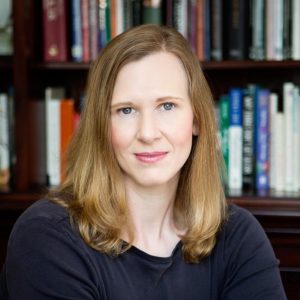 Susan McCauley is a writer / director / producer / actress who fell in love with writing, theater, and film when she was eight-years-old. That passion inspired her to receive a B.A. in Radio-Television with a minor in Theater from the University of Houston, a M.F.A. in Professional Writing from the University of Southern California, and a M.A. in Text & Performance from the Royal Academy of Dramatic Art (RADA) and King’s College in London. Susan also studied acting at Playhouse West with Robert Carnegie and Jeff Goldblum (Jurassic Park, Independence Day) in Los Angeles.
Susan McCauley is a writer / director / producer / actress who fell in love with writing, theater, and film when she was eight-years-old. That passion inspired her to receive a B.A. in Radio-Television with a minor in Theater from the University of Houston, a M.F.A. in Professional Writing from the University of Southern California, and a M.A. in Text & Performance from the Royal Academy of Dramatic Art (RADA) and King’s College in London. Susan also studied acting at Playhouse West with Robert Carnegie and Jeff Goldblum (Jurassic Park, Independence Day) in Los Angeles.
While living in Los Angeles, Susan wrote the story for and produced a short film, which later won awards at the Houston International Film Festival and the Seabrook Film Festival. In 2002, Susan moved to London to further explore professional theater. While in London, her stage adaptation of Nikolai Gogol’s “The Nose” was performed at the Royal Academy of Dramatic Art’s George Bernard Shaw Theatre; and, scenes from her play The Prisoner: Princess Elizabeth were performed at HMS Tower of London. She returned home to the U.S. in 2005. In 2007, she was the line producer of the Emmy Award nominated Civil War short film Now & Forever Yours: Letters to an Old Soldier.
Susan has three short stories published, one of which, “The Cask,” was made into an award winning short film. Susan is currently working on her fifth novel and has two feature length screenplays and one short film in development.
Here’s the interview:
Poseidon’s Scribe: When and why did you begin writing fiction?
Susan McCauley: I dabbled a bit with fiction in graduate school. (I received an MFA in writing from the University of Southern California, but my thesis was in screenwriting.) It wasn’t until I was living in London and began re-reading middle grade and young adult fiction as part of a teaching program I was in that I decided to start really writing fiction. I was inspired to write a short story, “The Lost Children of York,” based on a Yorkshire legend I’d heard on a ghost tour. Then, when I saw The Woman in Black on stage in London, I thought, I need to flesh out my story and do something more with it. I evolved “The Lost Children of York” into a play, which was my thesis at the Royal Academy of Dramatic Art and King’s College (I received an MA there in Text & Performance). Fast forward many years, I adapted the play into a screenplay that is now in development.
After writing that first short story, “The Lost Children of York,” which was never published, I decided I liked the freedom of writing fiction. Screenwriting is a very visual medium, which I love, but I think you have more control over your creation as a fiction writer. I like that aspect of it. It’s taken years and a lot of work to feel like I’m beginning to get my fiction where I want it to be. . . and, obviously, I hope I’ll continue to grow as a fiction writer and screenwriter for the rest of my life.
P.S.: Who are some of your influences? What are a few of your favorite books?
S.M.: This question is always hard for me to answer. I think there are many books from my childhood that shaped me. However, I’ll tell you who I think inspired me as a young reader. . . and as a reader today. As a child, I was totally inspired by Madeleine L’Engle’s A Wrinkle in Time and C.S. Lewis’s The Lion the Witch and the Wardrobe series. Laura Ingles Wilder’s accounts of life on the prairie also fascinated me. As an adult, some of my major influences have been William Shakespeare, Shirley Jackson, Johnathan Stroud, and Mary Downing Hahn. Some recent favorite books have been Took by Mary Downing Hanh and the Lockwood & Co. series by Johnathan Stroud.
P.S.: Did your training in acting help prepare you to write fiction?
S.M.: Absolutely. There is no doubt that acting training has been extremely helpful informing character creation and dialogue.
P.S.: On your Facebook page, you post “Forgotten Friday” photographs of abandoned sites. Do these inspire settings for your stories?
S.M.: None of these specific photographs have inspired any stories yet. . . but I find something sad and haunting about abandoned places. Some are beautiful. Some are devastating. They all have their own forgotten pasts. So, those images make me wonder: what stories have been lost in the past of those places?
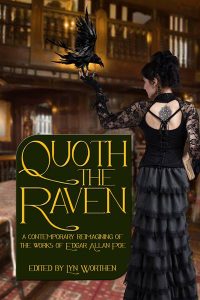 P.S.: Your contribution to the anthology Quoth the Raven is “The Cask,” inspired by Poe’s Amontillado story. I love that your story was made into a film, now available on YouTube. This is a dream held by many writers. How did the story-to-film transition happen for “The Cask?”
P.S.: Your contribution to the anthology Quoth the Raven is “The Cask,” inspired by Poe’s Amontillado story. I love that your story was made into a film, now available on YouTube. This is a dream held by many writers. How did the story-to-film transition happen for “The Cask?”
S.M.: I was teaching an online course for Margie Lawson’s Writer’s Academy about adapting fiction for film, and as I was pulling together material for the course, I adapted my short story, “The Cask,” into a short screenplay to use as an example. When I finished the script, I thought, “this would make a good short film.” So, with my background in film, I started reaching out to some friends in L.A. to help me make it happen. At the time, nothing came out of Los Angeles, but I was led to some filmmakers in Houston, where I live, who really loved the script and wanted to help me make it. In hindsight, I wish I would have directe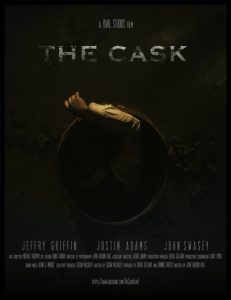 d “The Cask” since Hollywood really wants to see more women directors and it’s something I’m getting more interested in – but at the time, I was solely focused on getting the script produced. Long story short, I was the executive producer on the project. There isn’t money in short films so it wasn’t something I could go and seek out investors for. So, about half of the budget was my money, and the rest came from an Indiegogo campaign. I wish we’d had a bit more money since a couple pages were cut from my script. . . but we did the best we could with what we had (which is typical of filmmaking – especially indie filmmaking.)
d “The Cask” since Hollywood really wants to see more women directors and it’s something I’m getting more interested in – but at the time, I was solely focused on getting the script produced. Long story short, I was the executive producer on the project. There isn’t money in short films so it wasn’t something I could go and seek out investors for. So, about half of the budget was my money, and the rest came from an Indiegogo campaign. I wish we’d had a bit more money since a couple pages were cut from my script. . . but we did the best we could with what we had (which is typical of filmmaking – especially indie filmmaking.)
For those who are interested, here is “The Cask” on YouTube. (It did win an award for best film adaptation and played at several festivals around the United States.)
P.S.: Congratulations on that film award! Next question: suppose you’ve traveled through time and met yourself at a point when you were first thinking of being a writer. What one thing do you tell this younger version of you?
S.M.: I’d tell myself to start focusing on writing earlier. The acting training was great, but I wish I would have gone into college as an undergrad knowing I wanted to be a writer. I knew I liked writing back then – I’ve known it since I was about eight years old – I just wish I would have been a lot more focused on it sooner.
P.S.: Is there a common attribute that ties your fiction together (genre, character types, settings, themes) or are you a more eclectic author?
S.M.: I find myself writing dark things. Supernatural. Horror. Dark fantasy. (The only exception with my fiction is my 9/11 story, “The Butcher’s Boy,” which is a psychological horror and thriller.) I’m beginning to see some common themes emerging in my writing: overcoming loss, revenge, redemption, fighting for something (or someone) you love/believe in. My screenplays and short stories to date have been for adults and young adults, but my novels (all of which are still works-in-progress) are strictly middle grade and young adult books – so far.
P.S.: What are the easiest, and the most difficult, aspects of writing for you?
S.M.: Sometimes I don’t feel like any of it is easy. LOL. I suppose the actual sentence construction and play with word choice are two of the easier things for me. The most difficult aspect for me in fiction is finding the voice of my book. Voice is such an elusive thing. James Scott Bell’s book Voice: The Secret Power of Great Writing is probably the best thing I’ve read that describes what it is and how to capture it.
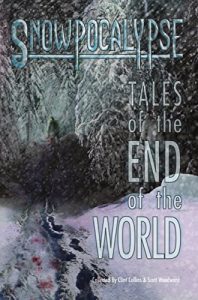 P.S.: Your story “The Snow Woman” appears in the anthology Snowpocalypse: Tales of the End of the World. Please tell us about that story, its protagonist, and what inspired the tale.
P.S.: Your story “The Snow Woman” appears in the anthology Snowpocalypse: Tales of the End of the World. Please tell us about that story, its protagonist, and what inspired the tale.
S.M.: With an interest in history and myths, I often try to blend those into the fantasy and supernatural that I most often write. For “The Snow Woman,” I landed on the Japanese myth of Yuki-onna and my interest was immediately piqued. As for the mummification aspect of the story, I combined two practices from different regions – self-mummification of the Sokushinbutsu, a sect of Japanese Buddhist monks, and the shrunken head practices of the Jivaroan tribes of South America. I remember seeing the shrunken heads of a dark-haired woman and a mustached man in the natural history museum when I was a child. They terrified me. The Jivaroan tribes believed they could trap the spirit of an enemy by removing their head, shrinking it, and sewing the lips closed. This story was the perfect opportunity for me to use something that scared me for years.
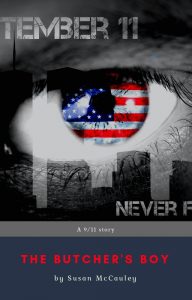 P.S.: It’s been just over seventeen years since the 9/11 terrorist attacks. You wrote “The Butcher’s Boy,” available here, a short and gripping tale about a young man and his father experiencing the disaster near the Twin Towers. What would you like readers to know about this story?
P.S.: It’s been just over seventeen years since the 9/11 terrorist attacks. You wrote “The Butcher’s Boy,” available here, a short and gripping tale about a young man and his father experiencing the disaster near the Twin Towers. What would you like readers to know about this story?
S.M.: The terrorist attacks made me look at the world differently. They were horrific, but they also made me realize I was willing to fight for my country. I have a gap in my writing career – a time when I didn’t write creatively – and worked for a bit for the United States government. I was trying to make a difference. As for the story, I don’t want younger generations to forget what happened on 9/11. I want them to remember the people who died, the rescuers who sacrificed their safety (and lives), and the people who survived. I want younger generations to remain vigilant. And I want them to know that they can make a difference.
P.S.: What is your current work in progress? Would you mind telling us a little about it?
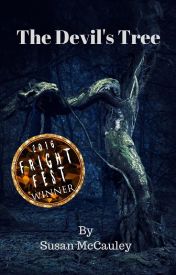 S.M.: I have a novel I recently “finished,” which is on submission. It’s a young adult story called The Devil’s Tree, which is actually an expanded version of my short story of the same name on WattPad. It’s a ghost story about a teenager overcoming her life-situation and learning to accept herself.
S.M.: I have a novel I recently “finished,” which is on submission. It’s a young adult story called The Devil’s Tree, which is actually an expanded version of my short story of the same name on WattPad. It’s a ghost story about a teenager overcoming her life-situation and learning to accept herself.
I also have two feature films in development. One is a psychological horror, The Murdering Kind, which is being directed by my amazing friend Academy Award winner Barney Burman. 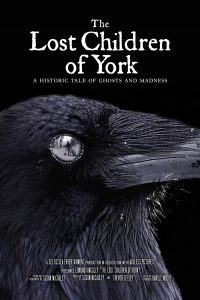 The other is The Lost Children of York, which is an adaptation of the play I wrote when I lived in London. The lovely and talented Edmund Kingsley is working with me on The Lost Children of York as a co-producer and actor.
The other is The Lost Children of York, which is an adaptation of the play I wrote when I lived in London. The lovely and talented Edmund Kingsley is working with me on The Lost Children of York as a co-producer and actor.
Poseidon’s Scribe: What advice can you offer aspiring writers?
Susan McCauley: Read as much as you can. Write as often as you can. Revise. Revise. Revise. And, no matter what, keep working. Find other writers – good writers – to inspire and encourage you. The whole process can be an emotional roller coaster, and in such an isolated profession we all need people who can give us guidance and encouragement through the ups and downs of the process.
Thanks, Susan.
Readers, I know you’ll want to find out more about Susan McCauley. You can keep up with her at her website, on Instagram, on Facebook, on Twitter, and on her Amazon author page.
Poseidon’s Scribe
